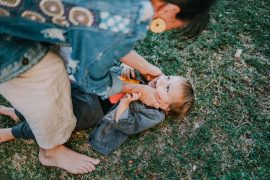How can a setback be impersonal? Certainly, some bad things are just bad luck, and could have happened to anyone. In many cases, of course, it is clear that he brought the setback on himself, but it still doesn’t indicate anything about who he is, but how he chose to act in that one instance. In other words, he failed the test because he didn’t study, not because he always fails tests and always will.
Maybe most important, help your child to see that he isn’t powerless in the situation. Martin Seligman, the trail-blazing researcher on optimism, says that the most important question to ask when confronted with misfortune is:
“Is it possible that there are some ways that you could change the outcome with some personal effort on your part?”.
4. Help your child learn to cultivate optimistic thinking
…with these three ideas:
- There are actions I could or can take to change the situation. (As opposed to “I am a victim here”).
- There are specific reasons something happened. (As opposed to the global “Everything always goes wrong”).
- The cause is clearly leading to the effect, and that is true over time. Sometimes I can affect those factors, which means I can make the outcome better. Sometimes I can’t affect those reasons, but that means they are not my fault. (As opposed to “Bad things just happen to me” or “Life is just out to get me”).
5. Confront negative self-talk
The problem with self-talk is that when you hear it, you believe it! Then you act as if it were true. But in fact, just because you are telling yourself something does not mean it’s true. It’s a belief that could be wrong. There are many ways to interpret events, and some are much healthier than others.
Cognitive therapists teach pessimists to confront this kind of thinking with a three-step process: Notice it, Externalise it, and Dispute it (NED). You can teach yourself, and your child, the NED process:
- Notice negative self-talk.
- Externalise it. Treat it as if it were said by an external person whose mission in life is to make you miserable. (Some kids call him NED).
- Dispute it in the same way you would an external person. We generally have the skill of disputing other people when they make false accusations, and we can learn to do so with ourselves as well.
6. Model optimism
Do you say things like “I know we’ll find a parking space soon!” or “We’ll NEVER find a parking space! I KNEW this would happen!”?
Your view of the world and your prospects within it communicates itself to your child daily. If you want to help your child become more optimistic, experiment with learning to be more optimistic yourself. All of the techniques in this article work for adults, too, of course. And they all offer opportunities for wonderful dinner table conversations with the whole family. Why not start an optimism challenge in your family this month?
Originally published here.
Dr. Laura Markham is the founder of PeacefulParentHappyKids.com and author of Peaceful Parent, Happy Kids, Peaceful Parent, Happy Siblings and her latest book, the Peaceful Parent, Happy Kids Workbook.










